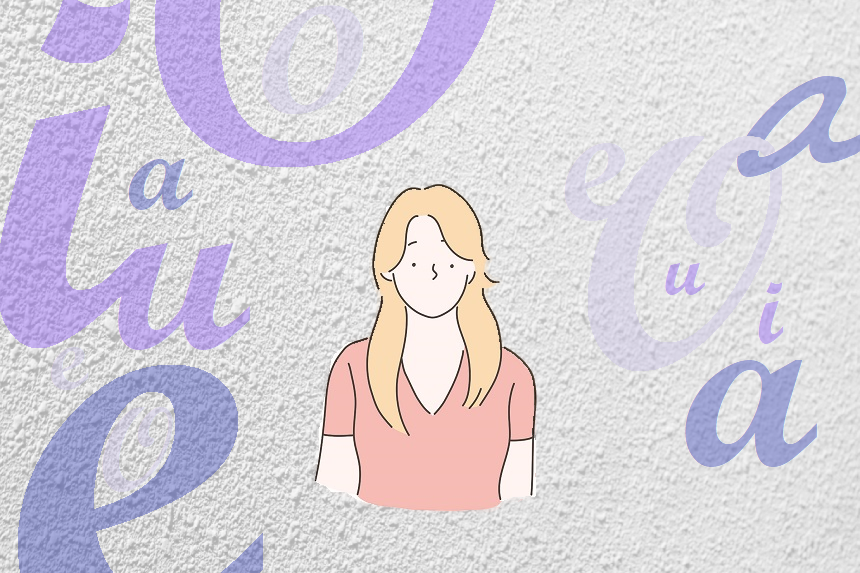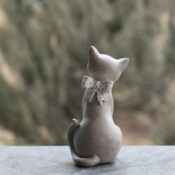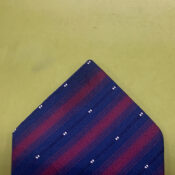Anna had come unvoweled. There was not a single vowel in her. They had exited her like air when you are punched in the stomach, with a whoosh. But there was no punch. It just happened. And instead of air, vowels.
Her husband barely even noticed, but he didn’t notice anything. Her kids noticed right away. The older kids were skeptical of her, and petulant. They were uneasy, but they had no more ability to process it than they had ability to process their own pubescence. They were like tents of skin with hot air filling them, puffing them out. The young toddler had no problem with her mom’s unvoweling. While her expectations of her mom were extensive and extreme, she was also the most flexible in her outlook on the world. As long as she was being delivered certain basic needs, she was okay.
“Wld y lk ck,” Anna said to her little one.
“Yes, yes,” the little one sang. “One more cookie.”
Anna hugged her. “Gd grl.”
The real problem was at work, at the pharmacy, where people were not able to understand her and were not willing to be flexible.
“Wlcm t r phrmcy,” she would say when people walked in, “F thr’s nythng w cn d t hlp y t, pls lt s knw nd w wll chng tht frwn nt dllrsgn.”
People came in sick and were confronted with an incomprehensible cashier and it made them uncomfortable. It was unsettling, to be sure. More than one person threw up. So her boss moved her away from the front door and back into the aisles, to stack the shelves. If anyone asked her questions, she was told to ignore them and slowly back down the aisle until she could slip around the corner and run.
It would soon be too much. She couldn’t keep hiding from customers, she couldn’t keep parenting without talking to her teenagers, she couldn’t keep living without words. She had to change things.
She poured herself some cf and welcomed the jolt of cfn. She took out a piece of ppr and a pncl and sat down at the ktchn tbl. Hw dd ths hppn? She wrote down everything she could think about vowels and why they might disappear.
It seemed pretty clear to her, at least as a metaphor. No one listened to her. Her marriage wasn’t the worst, but it wasn’t the best either. She and her husband were two planets traveling through the same celestial space but only occasionally matching orbits. It was the embodiment of indifference. Her teenagers were awful and fine. They were awful, yes, but in a way she had been expecting for the past decade. Her toddler required everything. Her job was uninspiring, but she had been working since she was thirteen and the closest she had ever come to an inspiring job was sweeping the aisles of the multiplex when she was sixteen because she got to watch free movies. None of it was a surprise, so why had her vowels abandoned her now?
She had no one who could help her. She went to the doctor’s office but the nurse looked spooked out by her. She was certain this woman had seen every kind of broken bone and open wound, and yet she was uneasy with Anna’s lack of vowels? The nurse just shook her head and said they couldn’t do anything about it. It wasn’t a medical problem. Anna slunk away.
She searched back in her memory for anyone who might know about vowels. The only person who had ever told her anything about vowels was her fifth-grade teacher, Ms. Lucia Brown. So Anna left work early one day to drive to her old school. Her supervisor was happy to let her go.
She was lucky. Ms. Brown still taught there. The secretary just directed Anna upstairs to the fifth grade classrooms. Anna stood at the doorway, slightly too nervous to walk in. Ms. Brown sat at her desk, grading. She didn’t actually look much older, perhaps because Anna’s expectations had aged along with her. Ms. Brown had looked old to her before and she looked old to her now.
Ms. Brown looked up, saw Anna hovering, and beckoned her in. She recognized her right away. It was one of her superpowers: she could remember all of the children she had taught and recognize them through the soft layers of flesh that the years draped on them.
“Anna Sears, isn’t it?” she said. She tilted her head and looked Anna over. “Why have you come back?”
“Hv lst m vwls. Dnt knw wht t d.”
Ms. Brown looked at her with surprise. She noticed for the first time how scared and sad Anna looked.
“You’ve lost all your vowels?”
Anna nodded. Ms. Brown touched her face.
“You poor thing! You look like a pancake.”
“Hw m sppsd t gt m vwls bck?”
Ms. Brown looked at her with soft eyes. She had taught thousands of fifth-graders and there was almost always something sad about seeing them later on in their lives. When they were in her class they were open books and by the time they came back they were closed. Even when they seemed successful, their choices had gone from many to a few. But this was the worst she had seen.
She tried to hold Anna’s gaze but the woman kept looking away and back again.
“Anna, are you angry?”
Anna looked surprised.
“Ngry?”
“Yes, are you mad that this has happened to you?”
Anna shrugged and shook her head. Mad wasn’t the right word.
“No, you aren’t angry. You’ve already resigned yourself to this.”
Anna looked down at her hands.
“You’re an accepter,” Ms. Brown said.
“Wht?”
Ms. Brown had studied advanced physical grammar at a minor ivy league school, so she knew something about this.
“An accepter. You accept things. I bet you accept how everyone treats you. If you’re a strong accepter then the people around you become expecters. Or maybe they don’t become expecters, maybe you just draw expecters to you. Like a magnet. The expecters eat your vowels. That’s what they do. Usually we can lose a vowel or two and barely notice (in this day and age), but if we’re surrounded by expecters, we can lose them all.”
“Wll thy cm bck?”
“Once it’s this bad? Maybe. You need to change your polarity. You need to become a refuser. You need to say no to everything.”
“Vrythng?”
“Practically.”
Anna was sweating.
“Can you do that?”
“N”
“Good.” She patted Anna on the cheek. Anna smiled. “That’s a start.”
Anna drove home slowly. What the fck was she going to do? How could she refuse her own family. It seemed impossible. She went next door to get her daughter and the first thing the toddler did was reach her hands up and say, “Up.” Instinctively, Anna reached for her but then she felt the touch of Ms. Brown on her cheek, and she said, “N.”
Her daughter stopped. She frowned, bewildered.
“Up!”
“N.”
“Up up up.”
Anna shook her head. This was going to be impossible. Her daughter wanted a snack, she wanted to play, she wanted Anna to read to her, she wanted to go outside in the yard, she wanted to go to the park. Anna was quickly exhausted by saying no, so she turned on the TV to get a break. Then she brought her a snack, but it was on her own terms, at her own pace.
She didn’t know what to do with her hands. If she was going to refuse everything that she normally accepted, that meant she couldn’t do any of her normal activities. It was 4 o’clock. The teenagers would be getting home soon, and then her husband, and normally she would be getting dinner ready. In fact, there were defrosted pork chops in the fridge, waiting for her. She watched her hands flutter like useless birds. “Fck t ll,” she said out loud. Fuck it all. I hate everything and I don’t want to do this anymore. She stood up and started tidying the house. She knew she shouldn’t clean up other people’s messes, but she couldn’t do nothing.
The teenagers came home from high school. Her son moped around the kitchen waiting for a snack. He wasn’t sure what to do when Anna kept not making it. After a while, he said humph and took a box of cookies to his room. Her daughter came down and asked for a ride to her best friend’s house.
“N. Y cn wlk.”
Anna walked her fingers across the counter and raised her eyebrows. Her daughter rolled her eyes and slammed the door behind her. Anna sunk into a chair, exhausted by stubbornness.
When her husband came home, he looked around the kitchen. He looked at the absence of food. He looked at Anna.
“No dinner tonight?”
“N. M gng t.”
Why would she be going out? It just came out of her mouth. She didn’t want to be in the house. She didn’t want to say no over and over. She searched for a reason. She never went out with friends. She didn’t have family in town. She thought of the flyers that came in the mail for night classes at the community center. She liked to flip through the selections and imagine taking a watercolor class or an Italian conversation class. But she always dismissed it. Adult education classes, she imagined, were for senior citizens trying to find a new passion.
“Y hv t mk dnnr fr th kds. Sgnd p fr clss,” she said. He looked at her, uneasy and uncomprehending, so she snatched a scrap of paper and dashed down: You have to make dinner for the kids. I signed up for a class.
It was a lie, but she didn’t care.
“Where?” he asked, skeptical.
“Th Cmmnty Cntr.” She picked up the toddler and put her in his arms for dramatic effect. “Nd nd t g nw.”
She was out the door before he could say anything. She was semi-confident he could figure something out for dinner. If not, the kids would live.
At the center, she didn’t want to make anyone uncomfortable, so she wrote a note for the receptionist: Are there any classes tonight? With open spots? I totally understand if there aren’t. Thank you.
The receptionist, a gentle-looking older man, glanced at a list. Anna wondered whether she looked desperate to him.
“Two classes going on right now. Advanced Bridge and Breakdancing. They both started last week, but that shouldn’t be a problem. People join late all the time.”
Anna walked down the hallway, frowning. Neither choice was appealing, but dancing might help her burn off all this nervous energy.
She slid into the room, arms crossed, feeling as out of place as an emu in the flamingo exhibit at the zoo. She shrunk into the back corner and looked around. She was surprised by the mix of students in the class. Young and old, women and men. Some seemed eager and open and others stared down at the floor, avoiding eye contact. They looked like Anna felt: awkward, full of doubt. There were two instructors: a woman and a man, both in their late twenties, Anna guessed. They both had big inviting smiles.
Anna was not happy to be there. Not really. She was anxious about what was going on back home. She was anxious about what her family would think about her. She was anxious about trying to breakdance in front of strangers. She was anxious that they would ask her a question and that she would have to speak aloud in front of them. She didn’t want people to throw up.
The instructors called the class to attention — What’s up, b-girls and b-boys! — and, after a brief reminder of what they learned in week one, jumped right into the basic moves. Soon Anna was learning to top rock and indian step, and at the end of class, when they put on some music and formed a circle, Anna took her turn like everyone else, her face burning. She felt ridiculous. Still, everyone clapped and cheered and she smiled.
She drove home slowly. When she got home, her husband was watching TV. The toddler was asleep and the teenagers were in their respective rooms.
“Hw dd t g?” she asked.
“What?” he said?
“Nthng,” she said. She went into their room and changed and went right to bed.
It was the next day, at work, that she realized she didn’t want to go home again. She dreaded it. She didn’t want to see any of them except the baby, and even the baby was a bundle of needs. Anna didn’t want to be in her house. So she took an extra-long break — what did she care what her supervisor thought? — and looked up her breakdancing teachers. It turned out that they had a small studio where they taught classes the rest of the week. They had classes available that very night. She could breakdance every night.
She gave her husband some coupons for pizza before she left. He was still too surprised to say anything the second night but on the third night he put his foot down.
“Anna,” he said, “I think it’s great that you decided to expand your horizons. Taking one evening class seems like a great idea. But three nights in a row? That’s too much. The kids need you here.”
“N,” she said. No. Every inch of her tongue wanted to say yes, to be an accepter. She also felt like the kids needed her there. But no. I’m a refuser, she thought. I can refuse him. I can refuse all of this.
“You should be here,” he said.
Her head exploded.
“Wht th fck r y tlkng bt, shld b hr? Hv lwys bn hr. M lwys hr. M hr ll dy xcpt fr whn g t m shtt prt-tm jb t shtt phrmc. D vrthng hr. Y gt t cm hm nd cllps nt th cch nl bcs I d vrthng fr y. D y knw whr th kds’ mth fldrs r? D y knw hw t gt hld f th schl f thy r sck? D y d nthng fr thm ftr y gt hm frm wrk?”
She stopped for a second to take a breath. She was holding her fists in front of her as if she were in a boxing ring.
He looked at her for a minute as if chewing over his words, figuring out the right response to her outburst. Maybe he was beginning to understand the source of her rage. He rubbed his chin a few times.
“I’m sorry,” he said. “I didn’t understand a word of that.”
She closed her eyes and breathed deep.
“F crs y ddn’t!” He hadn’t heard what she was saying for years.
She dissected their marriage with a dull knife. Why did they always hate each other? Why did they always fight silently? Why did they eat their resentment every night? Why did they chase sleep so that they didn’t have to talk? What were they even doing anymore?
She didn’t know. She just looked at him, long, long, long.
Long.
And she said, “F crs y ddn’t.”
“M gng t b mzng,” she said. I am going to be amazing.
“M gng t lrn ll th thngs,” she said. I am going to learn all the things.
“Thn t wn’t mttr whthr hv vwls.” Then it won’t matter whether I have vowels.
“G fck yrslf.”
She went to class every night. She waited until he was home from work, then she handed over the kids and left. To his credit, the kids didn’t die or starve. He made mac n cheese or spaghetti with sauce from a jar every day for weeks, and the only vegetables he served were baby carrots and canned corn. The toddler loved it and the teenagers complained they were bored, but Anna told herself to ignore it. N. Everything would be fine. One night she found him thumbing through her cookbooks, looking at the pictures for ideas. She soon found the leftovers of a casserole in the fridge.
After three months, the breakdancing instructors announced they were going to hold a dance performance so their students could show off. Anna felt as if she were balancing over a giant precipice, but she signed up anyway.
She couldn’t bring herself to tell her husband for three days. Finally she handed him the flyer.
“Wld y lk t cm t m brkdncng prfrmnc,” she asked. He read the flyer and then looked at her for a long time, almost as if he didn’t know her at all, like she was some curious puzzle to be figured out. Was he seeing this new Anna, this breakdancing Anna? Was he excited about how she was growing? Was this going to spark the romance again?
Because there had been romance. It wasn’t Hollywood romance. It wasn’t a Harlequin romance. But it was romance. Twenty years ago, he had loved her and, even more, been excited by her. He had been excited every time he saw her. There had been times when he devoured her with his eyes. He’d whisper secret desires — sometimes sweet, sometimes sexy — in her ear when they were in a movie theater or the booth of a diner. He always wanted to be alone. He loved her body and she loved his.
But then things became routine. They had kids and started living for the kids, not each other. They were tired. Always. It just felt easiest to do everything, say yes to everything. That’s when she became an accepter. Or maybe she was always an accepter and she just got better at it. But not anymore. Now she was becoming a refuser and she liked it. Maybe he was excited by it too. Maybe he would feel the way he did twenty years ago: intrigued, curious, challenged.
He finally shook his head. “No. No, I’m not going to watch your breakdancing performance. Do what you want, Anna, but I’m not going to sit there embarrassed that my wife — you’re almost forty, by the way — is dancing like some fool. You’re asking too much of me.”
He shook his head again and walked off to the den.
Anna collapsed into a kitchen chair. She felt like her insides had been scooped out and replaced with organs made of ice. She had been so scared to invite him, but she had really hoped he would share her excitement. She really thought he would come. She thought he was changing, a little, and trying in his own underwhelming way. It didn’t even have to be an earthquake of a change. A small change would be fine. If he could just see her, just see her for once, she thought she would be happy. But they were two people who didn’t know each other.
She went back to her old school the next day to find Ms. Brown. She brought a handwritten invitation, in case Ms. Brown couldn’t understand her. She handed Ms. Brown the invitation and stood there, sheepish.
“Ndrstnd f y cn’t cm. R dn’t wnt t.”
Ms. Brown took her Anna’s hands between her own. Then she hugged Anna. Anna cried, just a little.
“Of course I’ll come. I love breakdancing.”
“Rlly?”
“No,” she said. She smiled. “But I love my students.”
“Cld y st wth th kds?”
“Yes, I’ll sit with your kids. They should see you dance.”
So that night Anna put on some baggy sweats and a big tee-shirt. She put her hair up in a bandana. Her teenagers, surprisingly, were eager to see her perform.
Halfway through the show, Anna saw her husband. He was leaning up against the back wall like some middle-aged, low-rent John Cusack. He hadn’t come all the way in and grabbed a chair, but he was there.
After all these months of not understanding her, of not trying to understand her, he had come. Saying no had worked. Did that mean her vowels would start coming back too?
She’d thought she would’ve had some improvement by now, even if it was just a stupid vowel, like the U. Nothing. Then again, it probably takes a long time of saying no in order to counteract a lifetime of saying yes. But there was also the possibility they would never come back. She would have to make changes. New friends. A job that didn’t require her to talk, or even better, one where they didn’t care how many vowels she used. Maybe that job and those people were out there, waiting for her around the corner. If she found them, she might be able to buy the kids things from her own money. And then she could sit around and say N all fckng dy lng.
Anna realized her hands and her jaw were clenched tight. She was furious that her husband was there. She had thought she was doing this for him. For the marriage. For her vowels. But she didn’t want him there. No. More than that. She hated seeing him there. He had ignored her pain, her isolation, her unvoweling for months! She didn’t want him swooping in and stealing her moment.
A motion caught her attention. Her teacher was waving at her. It was her turn to dance at the center of the cypher. She entered the circle. “Fck y,” she mouthed and flipped her husband off, as if it were part of the dance. He probably wouldn’t see it. Or maybe he would, even though he saw nothing else.
She danced her ass off.
After her dance was done, after she had resumed her place in the circle, she looked over at Ms. Brown and her children. They were all standing. Ms. Brown was beaming, and they were all clapping for her, even the teenagers. On the drive over, her little one had kept saying, “Bake Dan, Bake Dan.” Anna took it as the excitement of someone who had no idea where she was going and might indeed think that she was going to a bakery for treats. Maybe, Anna thought, she would take the kids out for dessert after the performance. She wouldn’t invite her husband. The kids would be nice to her, proud of her. That would be nice.
Featured image: Vectorium on Shutterstock and Augustine Wong on Unsplash
Become a Saturday Evening Post member and enjoy unlimited access. Subscribe now




Comments
This story had my head spinning, with emotions all over the place. I love dark comedy, and found myself laughing at what (intellectually) I knew was actually tragic and shouldn’t have been laughing at. So then I felt guilty but didn’t burst into tears like Mary Richards at Chuckles the Clown’s memorial service that time.
Burst into further laughter is more like it. One of my favorite parts of the story was Anna’s re-meeting her 5th grade teacher, and HER shock and surprise. I would imagine Ms. Brown was quite a good actress herself. You see, half the time in life good acting involves not reacting to something that takes you by surprise. Returning former students years later would test that ability, I would think.
We can only hope her breakdancing helps Anna break her speech impediment block so she won’t have the perception of either being mentally retarded or deaf (by others) that’s been harmful to her personality. This would make a great stage play, but not for the faint of heart hearing expletives, Mr. Chapman.